Vasudeva Sankarshan Pradyumna Aniruddh names explanation
Namaste friends, how are you doing today? Welcome to #BhagavanBhakthi website / blog.
Bhagavan Lord Sri Krishna (Vasudeva) (Sankarshana) (Pradyumna) (Aniruddha) and Goddess Rukmini (Lakshmi) blessings to you and your family!
In this website / blog, you will always learn about #Hinduism #Sanskrit language.
Also subscribe to my YouTube channel from this link #BhagavanBhakthi to view videos about #Hinduism #Sanskrit language.
Just before moving towards to know about “Vasudeva Sankarshan Pradyumna Aniruddh names explanation“, let us know few basic and important information.

In the great ‘Sri Vishnu Sahasranama Stotram‘, it is eulogized as Lord Sri Maha Vishnu as Chaturaatma, Chaturvyuhah, Chaturmurti…
Here, चतुरात्म (Chaturatma) refers to Lord Sri Vishnu’s fourfold अभिव्यक्ति / manifestations for the purpose of srushti / सृष्टि (creation), sthiti / स्थिति (sustenance), layana / लयन (dissolution) and धर्म प्रवचन / dharma pravachana (promulgation) of divine adhyatmika gnana / spiritual knowledge.
चतुर्व्यूह (Chaturvyuhah) refers to someone who adopts fourfold or four dimensional अभिव्यक्ति / manifestations (vyuhas) to carry out all of his (Lord Sri Maha Vishnu) activities. Lord Sri Vishnu assumes four svaroopas / forms as Vasudeva, Sankarshana, Pradhyumna, and Aniruddha.
चतुर्मूर्ति (Chaturmurti) refers to someone who is of four svaroopas / forms, that is, Vasudeva, Sankarshana, Pradhyumna and Aniruddha.
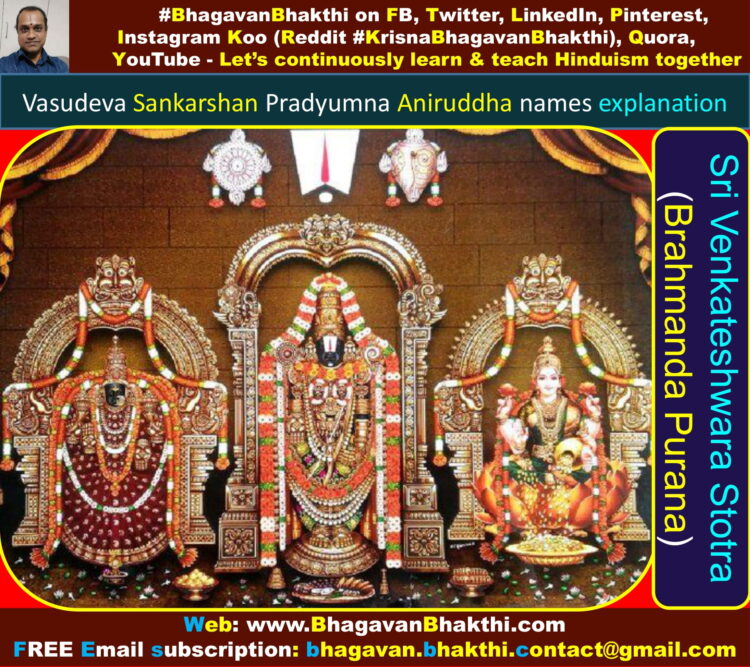
In the very first shloka of ‘Sri Venkateshwara Stotra (Brahmanda Purana)‘, Lord Sri Venkateswara (Bhagavan Sri Maha Vishnu’s avatar, that is – Lord Sri Balaji) who is none other than Lord Sri Narayana is eulogized as below:
वेंकटेशो वासुदेवः प्रद्युम्नो मितविक्रमः | संकर्षणो अनिरुद्धसच शेषाद्रिपतिरेव च ||
ವೆಂಕಟೇಶೋ ವಾಸುದೇವಃ ಪ್ರದ್ಯುಮ್ನೋ ಮಿತವಿಕ್ರಮಃ | ಸಂಕರ್ಶನೋ ಅನಿರುದ್ಧಶ್ಚ ಶೇಷಾದ್ರಿಪತಿರೇವ ಚ ||
venkatesho vaasudevah pradhyumno mithavikramah | sankarshano aniruddhascha sheshaadripatireva cha ||
Meaning of the above shloka : Lord Sri Venkatesha, Lord Sri Vasudeva, Lord Sri Pradhyumna, Lord Sri Mithavikrama, Lord Sri Sankarshana, Lord Sri Aniruddha and Lord Sri Sheshaadripati are one and the same, but have different svaroopa / forms.
Now let us know, who is Vasudeva (Vaasudeva) : In sarvottama adyatmika (supreme spiritual) sense Lord Sri Vaasudeva (Vasudeva) is the foremost and first amongst the four plenary expansions of Lord Sri Maha Vishnu.
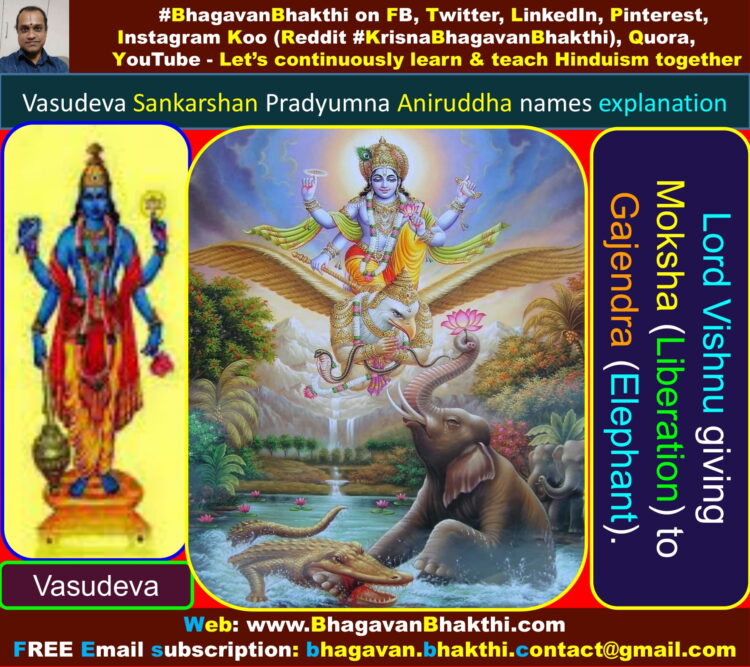
Lord Sri Vaasudeva (Vasudeva) is Moksha Pradaata (one who gives the moksha / mukti / liberation – A place in Vaikuntha), that is – someone who gives us the ultimate moksha / salvation to the deserving atmas / souls, starting from Sri Chatur Mukha Brahma Deva, other Devatags (Demigods) and up to ordinary people like us.
Lord Sri Vaasudeva’s (Vasudeva’s) place is the ultimate abode and most coveted pradesha / place, where every dharmic atma / soul will be longing to go and stay forever.
Many must of us have heard about the famous and very powerful hymn”
“ॐ नमो भगवते वासुदेवाय” | “ಓಂ ನಮೋ ಭಾಗವತೇ ವಾಸುದೇವಾಯ” | “ōṁ namō bhāgavatē vāsudēvāya” . This is called as Dvadashakshara (Dwadasha Akshara) (12 syllable) mantra.
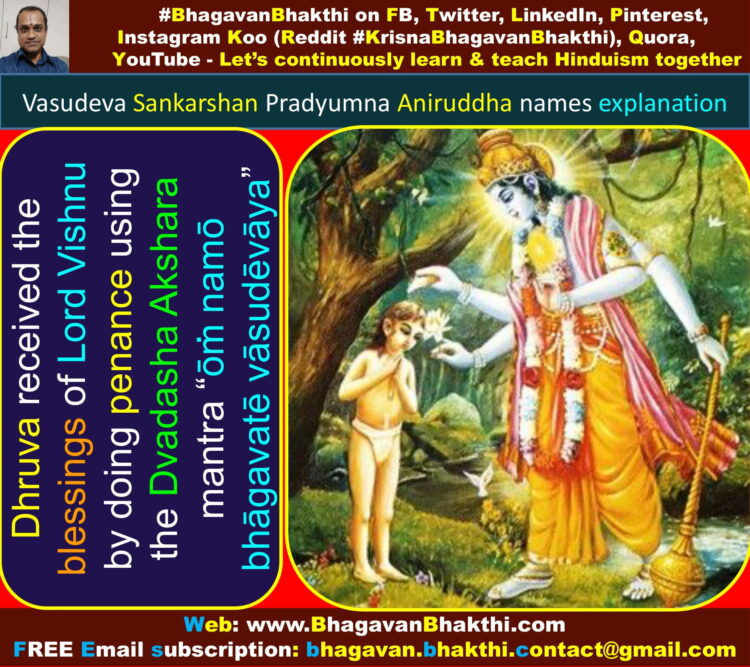
Why it is called as Dvadasakshara, let us know how: Here in the above hymn there are Dvadasha aksharas, that is, 12 aksharas (alphabets).
That is, Sl. No. – Akshara / Alphanet – 1. ॐ 2. न 3. मो 4. भ 5. ग 6. व 7. ते 8. वा 9. सु 10. दे 11. वा 12. य dedicated to Lord Sri Vaasudeva (Vasudeva) and this is called as Moksha / Kaivalya mantra.
If someone chants this mantra, this helps one to get moksha / liberation from the cycle of births and deaths. That is, one will go to the abode of Vaikunta.
वासुदेव / Vaasudeva (Vasudeva) (वा + सु + देव / Vaa + Su + Deva) means reverentially addressing the Sarvottama Bhagavan (Supreme God) of jnana / knowledge, the one who does the ‘srushti / सृष्टि (creation)‘ of the world, that is he is svayam Lord Sri Maha Vishnu.
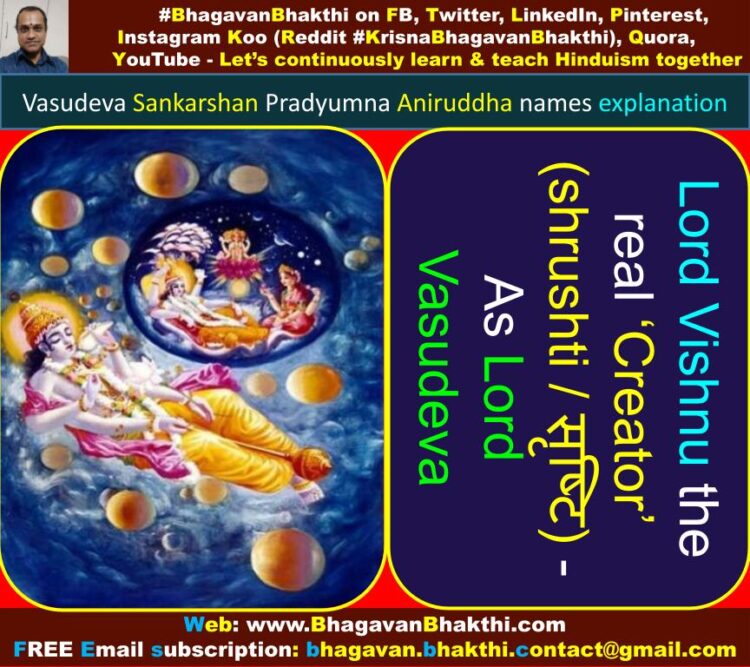
In shloka number 29 of ‘Sri Vishnu Sahasranama stotram‘ we find a reference to the word Vasu (read as Vasu / वसु and not as Vaasu) as given below:
The all pervading sarvottama / Supreme Lord Sri Maha Vishnu is eulogized as Vasuh (read as Vasuh and not as Vaasuh). Here Vasu (read as Vasu and not as Vaasu) means dweller or dwelling.
Lord Sri Maha Vishnu is called as Vaasudeva (Vasudeva), that is, the one who dwells in each and every element of this universe and everything dwells in Him. Lord Sri Vaasudeva (Vasudeva) also means the Lord of Vasus and son of Vasudeva (Vasudeva, that is father of Lord Sri Krishna).
Lord Sri Vaasudeva (Vasudeva) is the vishvatma (mega soul) present in every living being and nonliving being of the multiverses (unlimited universes), heart and soul of the multiverses and the only ‘Aatman’ (soul) that existed in the beginning of the creation of the multiverses.
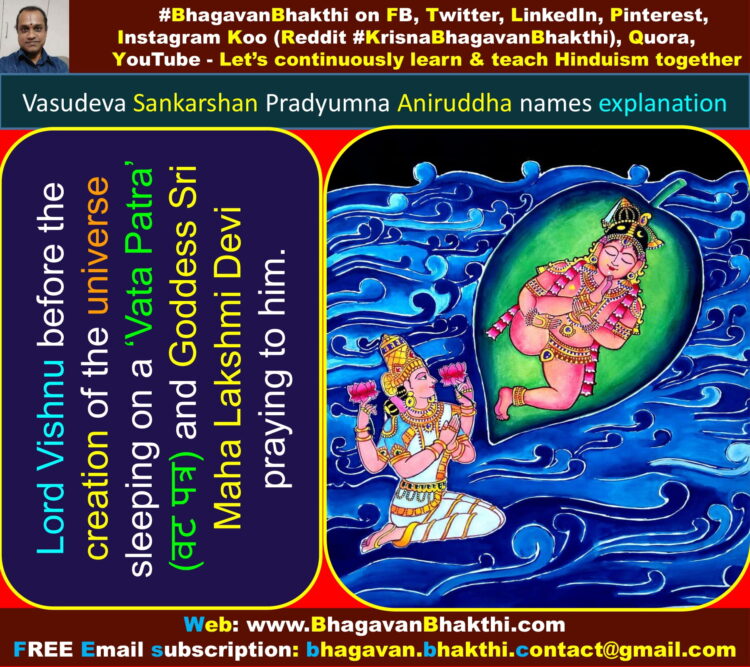
प्रीणयामो वासुदेवं देवतामण्डला खण्डमण्डनं प्रीणयामो वासुदेवम्…
ಪ್ರೀಣಯಾಮೋ ವಾಸುದೇವಂ ದೇವತಾಮಂಡಲಾ ಖಂಡಮಂಡನಂ ಪ್ರೀಣಯಾಮೋ ವಾಸುದೇವಂ…
prīṇayāmō vāsudēvaṁ dēvatāmaṇḍalā khaṇḍamaṇḍanaṁ prīṇayāmō vāsudēvaṁ…
Sri Vayu Deva’s avatar Sri Madhvacharya Ji in his famous Dvadasha Stotra (12 stotra) eulogizes the Sarvottama / Supreme Supreme Bhagavan. And recommend to Propitiate Lord Sri Vaasudeva (Vasudeva) who is the most precious jewel in the august gathering of all the Devatas / Demigods headed by Sri Brahma Deva.
Vasu means excellent and very precious gem, and Vaasudeva (Vasudeva) means Gem of a God who is the solitary unique soul of outstanding excellence.

In Bhagavadgita Vibhoothi Yoga (10th Canto shloka #37) Lord Sri Krishna says that, ‘among the descendants of Vrishni family, He (Sri Krishna / Vishnu) is Vaasudeva (Vasudeva)’, that is –
“vrshniinaam vasudevo’smi” (I am the Vaasudeva (Vasudeva) in the whole Vrishni vamsha / family). Sri Krishna is aptly called, as ‘He is personification of the Supreme Lord Vaasudeva (Vasudeva)’.
Now let us know, who is Sankarshana : Here “Sankarshana” is second in the line of four plenary expansions / dimensions of the primordial Sarvottma / Supreme Lord Sri Maha Vishnu.
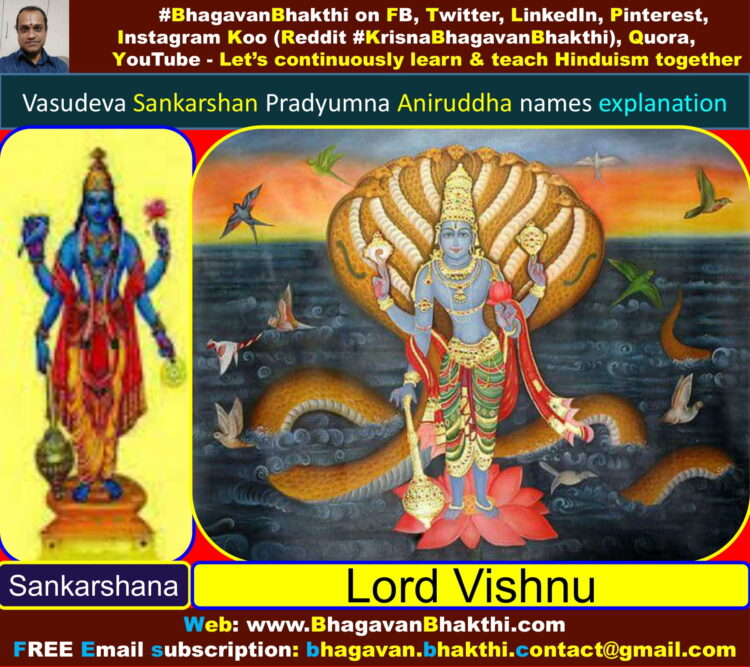
(That is, among Vaasudeva-Sankarshana-Pradyumna-Aniruddha).
What is the meaning of the name Sankarshana: सं + कर्षण / San + Karshana. Here सं / San means plenty, auspicious, good, together, complete, perfect, highly efficient, etc. And कर्षण / Karshana means drawing back, pulling off, withdraw, demolish, eliminate, reduce etc.
संकर्षण / Sankarshana literally means: Someone who has the power to destroy | Someone who has the power to annihilate | Someone who has the power to grasp | Someone who has the power to seize
Someone who has grahaka shakti (grasping power) | Someone who has akarshaka shakti (enchating power) | Someone who has the power to attract (aakarshana) | Someone who has the power to repel etc.
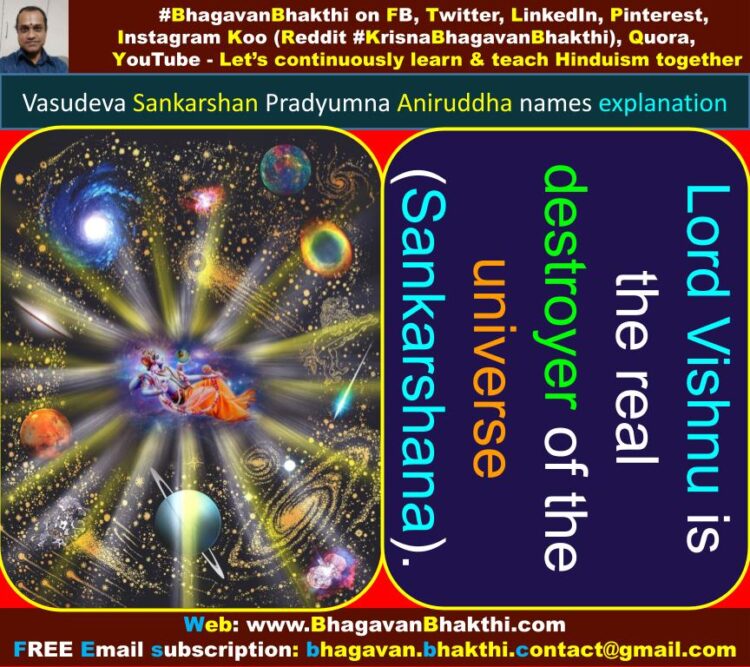
In sarvottama adyatmika / supreme spiritual sense संकर्षण / Sankarshana’f form is the most destructive form of Lord Sri Maha Vishnu.
With the संकर्षण / Sankarshana form alone, he has the strength, competency to completely destroy the multiverses (unlimited universes) at the time of deluge in a systematic manner using his form called ‘Sankarshana’ and pull back all entities into Himself.
In Sri Vishnu Sahasranama Stotram (shloka #59), Lord Sri Maha Vishnu is eulogized as “संकर्षणोअच्युतः” / “Sankarshanoachyutah”.
That is, he is the one who grasps all the movable and immovable objects towards Him at the time of great deluge destroying them, while He himself remaining composed and untainted as He is called as अच्युत / Achyuta.
(Here अच्युत / Achyuta is someone who cannot be defeated or destroyed. अच्युत / Achyuta – अ / A = Can’t be, छूत / chyuta = destroyed or defeated). In Mahabharata, Lord Sri Krishna’s elder brother Balarama is also known as Sankarshana.
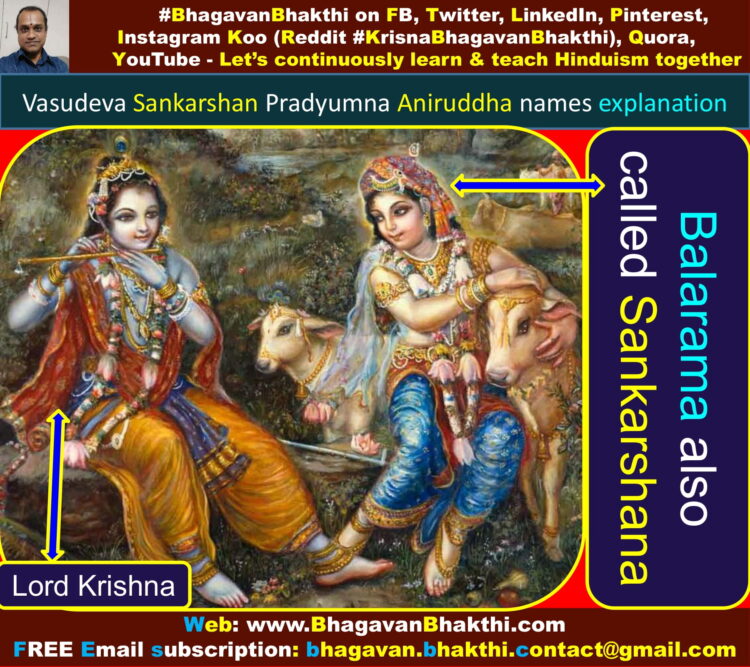
Please remember this Balarama’s form of Sankarshana is different and Lord Sri Maha Vishnu’s Sri Sankarshana form is different. Sankarshana also has another meaning.
Many of us know that Balarama initially was in the garbha / womb of Sri Devaki Devi. But Maya Devi (a form of Durga Devi) transferred Balarama into the garbha / womb of Sri Rohini Devi (She was also a wife of Vasudeva – read as Vasudeva and as Vaasudeva).
Here since Balarama was transferred from Sri Devaki Devi garbha / womb to Sri Rohini Devi’s garbha / womb, Balarama is also called as Sankarshana.
Here Sankarshana means, someone who is born by the method of transferring one woman’s garbha / womb to another woman’s garbha / womb. This method in today modern technology is known as ‘surrogacy‘.
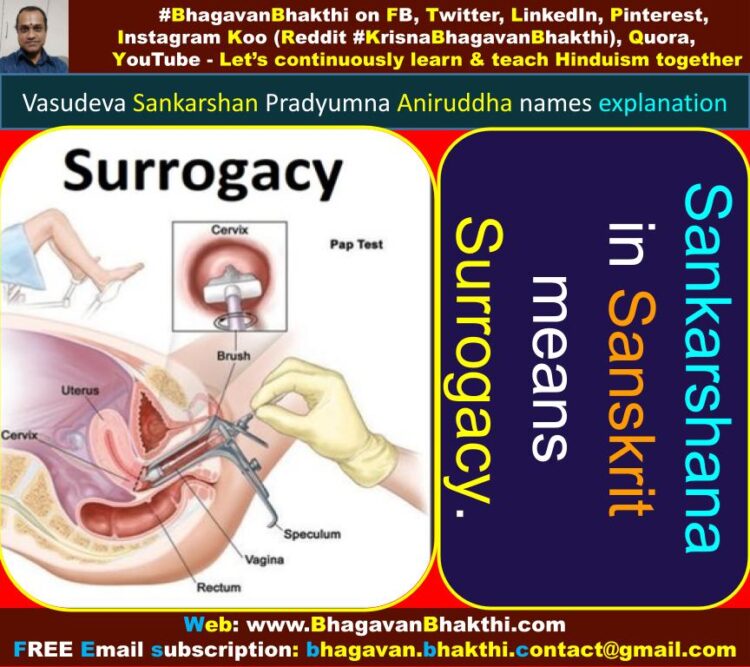
We must be proud of that we had this technology within our Sanatana Dharma / Hinduism since ages. Also, please note that the English word ‘surrogacy’ is taken from the Sanskrit word ‘sankarshana’.
Now let us know, who is Pradyumna? : In sarvottama adyatmika (supreme spiritual) sense Pradyumna is the 3rd dimensional expansion of Lord Sri Maha Vishnu, that is – the fourfold manifestation (Chaturvyuha) (among Vaasudeva-Sankarshana-Pradyumna-Aniruddha).
What is the meaning of the name Pradyumna: Here, ‘Pra‘ means greatest, vishishta / विशिष्ट (conspicuous), prominent, noticeable etc., and Dyumna means glory, strength, affluence etc.
Pradyumna means the sarvottama Bhagavan (Supreme God), the one with highly auspicious and infinite attributes glowing like suvarna / gold.
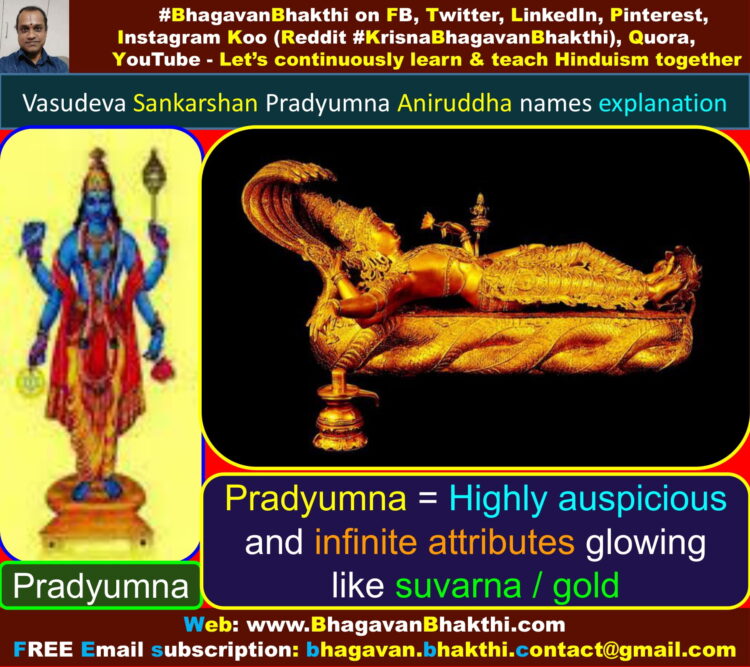
The ‘Sri Vishnu Sahasranaama Stotram’ (shloka #68) eulogizes the Lord Sri Maha Vishnu as
प्रद्युम्नो अमित विक्रमः | ಪ್ರದ್ಯುಮ್ನೋ ಅಮಿತ ವಿಕ್ರಮಃ | Pradyumno-amitavikramah
This means, the one who is having immense and unrivaled powers. In Pradyumna’s form Lord Sri Maha Vishnu acts as someone who has the creative power.
Pouranically (according to Puranas), we come across the character of Pradyumna in Srimad Bhagavatam as son of Lord Sri Krishna and His prime consort Rukmini Devi.
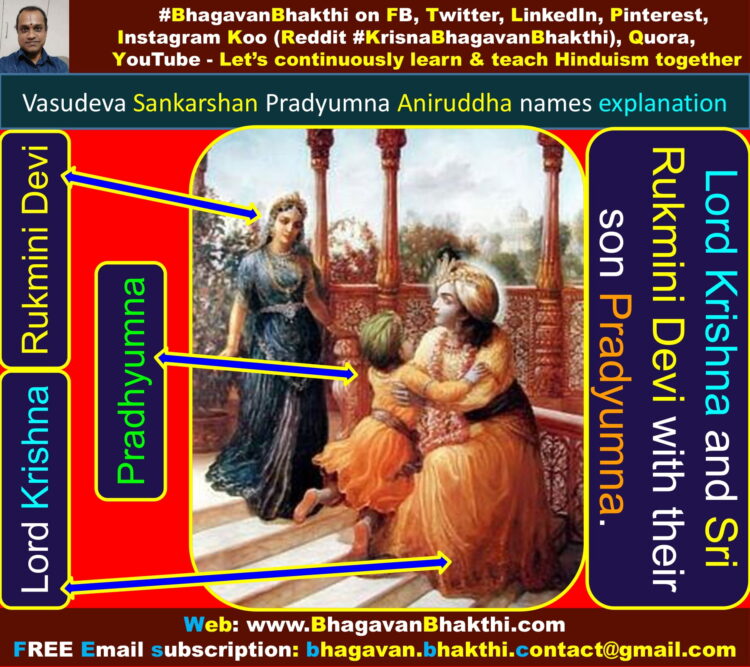
This Prayumna is different and Bhagavan (Lord) Sri Pradyumna is different. Lord Sri Pradyumna is another form of Lord Sri Maha Vishnu.
Now let us know, who is Aniruddha? Let us first know the meaning of the name Aniruddha:
Here ‘Niruddha’ means: Someone who can be suppressed | Someone who can be held back | Someone who is restrained | Someone who can be stopped | Someone who is vincible etc.
Whereas, ‘Aniruddha’ means: Someone who cannot be suppressed | Someone who cannot be held back | Someone who is unrestrained | Someone who is unstoppable | Someone who is invincible etc.
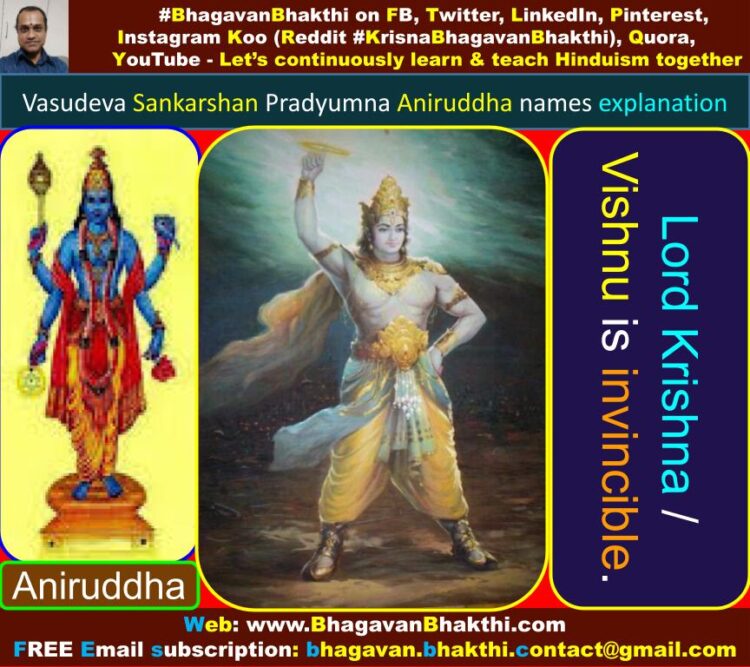
In a sarvottama / supreme sense, Aniruddha is an extented form of Lord Sri Maha Vishnu. He is among the fourfold manifestation, that is, Vaasudeva, Sankarshna, Pradyumna, Aniruddha.
Pouranically (according to Puranas) we come across a character called as Aniruddha in Mahabharata and Srimad Bhagavatham as the grandson of Lord Sri Krishna and son of Pradyumna (Pradyumna is the son of Lord Sri Krishna).
This Aniruddha is different and Lord Sri Aniruddha is different. This Aniruddha’s wife name was Sri Usha Devi and Vajra was their son.
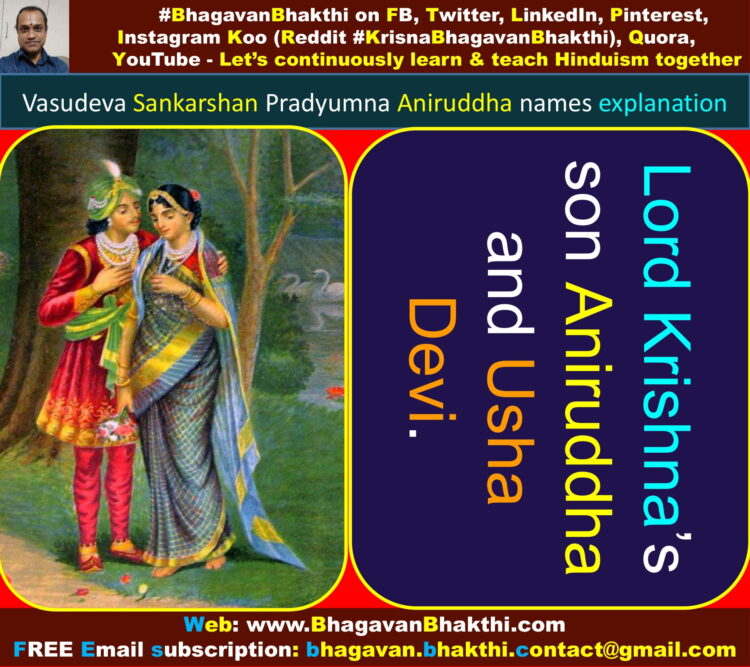
These four Vyuha forms (Vaasudeva, Sankarshana, Pradyumna, Aniruddha) also are said to represent the four states of consciousness, that is – Turiya, Shushupti, Swapna and Jagrat. These four forms are considered as Vishnu tattva or plenary expansions of the Moola roopa of Lord Sri Maha Vishnu.
Put together all the five names (that is, Vaasudeva, Sankarshana, Pradyumna, Aniruddha and Narayana) the name is called as, पंच नियामक भगवद रूप | ಪಂಚ ನಿಯಾಮಕ ಭಗವದ್ ರೂಪ | Pancha niyamaka Bhagavad roopa
that is, here pancha means five, niyamaka controlling and Bhagavad roopa means Bhagavan’s (Lord’s) form, that is, Lord Sri Maha Vishnu’s five forms.
These pancha / five transcendental expansions together form the complete worship of the Primordial Sarvottama Bhagavan / Supreme God Sri Maha Vishnu.
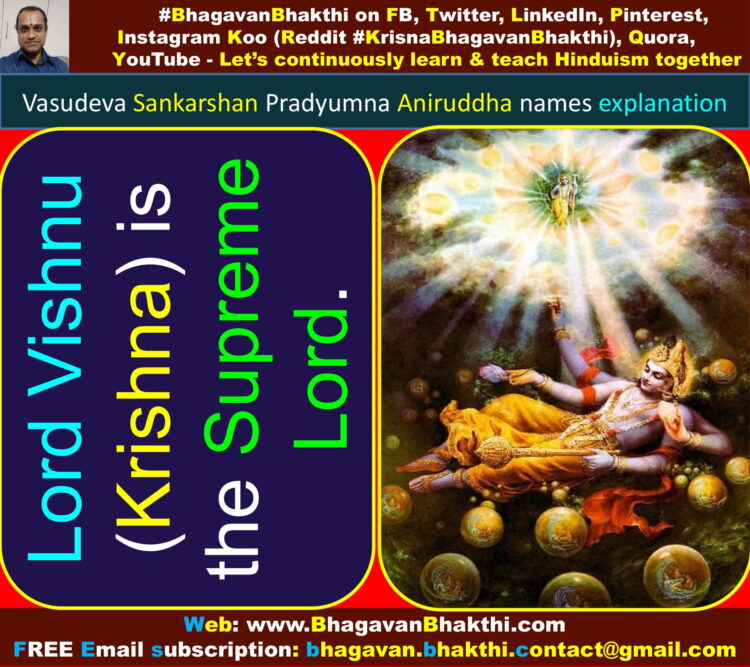
(Please remember that all these forms are one and the same forms of Bhagavan (Lord) Sri Vishnu. This doesn’t means only with the amalgamation of these five forms, Lord Sri Vishnu becomes a complete Bhagavan / God. No, it is no like that.
(All these forms are unique and all are one and the same. But Bhagavan / Lord takes different forms of Vaasudeva, Sankarshana, Pradhymna, Aniruddha and Narayana and does different leelas / drama. This is just like the avatars of Lord Sri Vishnu like Rama, Krishna etc.)
(Here Rama, Krishna etc are one and the same. But Lord Sri Vishnu takes these avatars to showcase different leelas / dramas. We should never ever differentiate different forms and avatars of Lord Sri Vishnu.)
(Lord Sri Vishnu remains same, whether in Vaasudeva avatar, Sankarshana avatar, Pradhyumna avatar, Aniruddha avatar, Narayana avatar, Rama avatar, Krishna avatar of any avatar. But takes different forms and / or avatars to do different leelas / pastimes.)
Benefits of chanting Vaasudeva (Vasudeva) Mantra
In the great Sri Vishnu Sahasranama Stotram (that is, in Phala Stuti), we find several benefits of chanting the divine hymn of the sarvottama / Supreme Lord Sri Maha Vishnu.
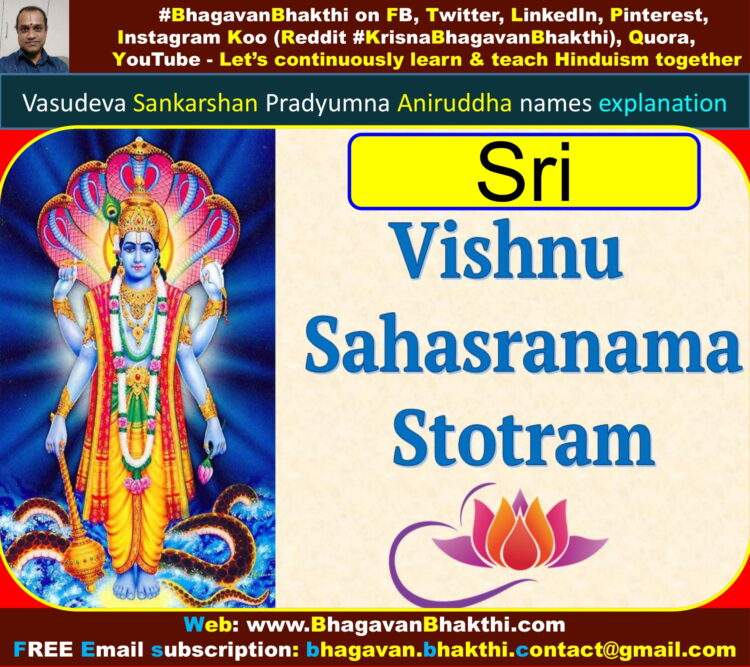
ವಾಸುದೇವಾಶ್ರಯೋ ಮಾರ್ತ್ಯೋ ವಾಸುದೇವೋಪರಾಯಣಃ | ಸರ್ವಪಾಪ ವಿಶುಧಾತ್ಮ ಯಾತಿ ಬ್ರಹ್ಮ ಸನಾತನಂ ।। (ಶ್ಲೋಕ #10)
वासुदेवाश्रयो मार्त्यो वासुदेवोपरायणः | सर्वपाप विशुद्धात्म याति ब्रह्म सनातनं || (श्लोक #10)
vāsudēvāśrayō mārtyō vāsudēvōparāyaṇaḥ | sarvapāpa viśudhātma yāti brahma sanātanaṁ।। (ślōka#10)
This means, someone who seeks out Lord Sri Vaasudeva (Vasudeva) aashirvaada / blessings with total bhakti / devotion and takes shelter only in Him, he / she will get cleansed from all paapas / sins and with that mind he / she thus will be purified and will definitely ultimately attain moksha / salvation.
ना वासुदेवभक्तानां-अशुभं विद्यते क्वचित | जन्म-मृत्यु-जरा-व्याधि-भयं नैवोपजायते || (श्लोक #11)
ನಾ ವಾಸುದೇವಭಕ್ತಾನಾನಾಮ್ -ಅಶುಭಂ ವಿದ್ಯತೇ ಕ್ವಚಿತ್ | ಜನ್ಮ-ಮೃತ್ಯು-ಜರಾ-ವ್ಯಾಧಿ-ಭಯಂ ನೈವೋಪಜಾಯತೇ ।। (ಶ್ಲೋಕ #11)
nā vāsudēvabhaktānānām -aśubhaṁ vidyatē kvacit | janma-mr̥tyu-jarā-vyādhi-bhayaṁ naivōpajāyatē।। (shloka #11)
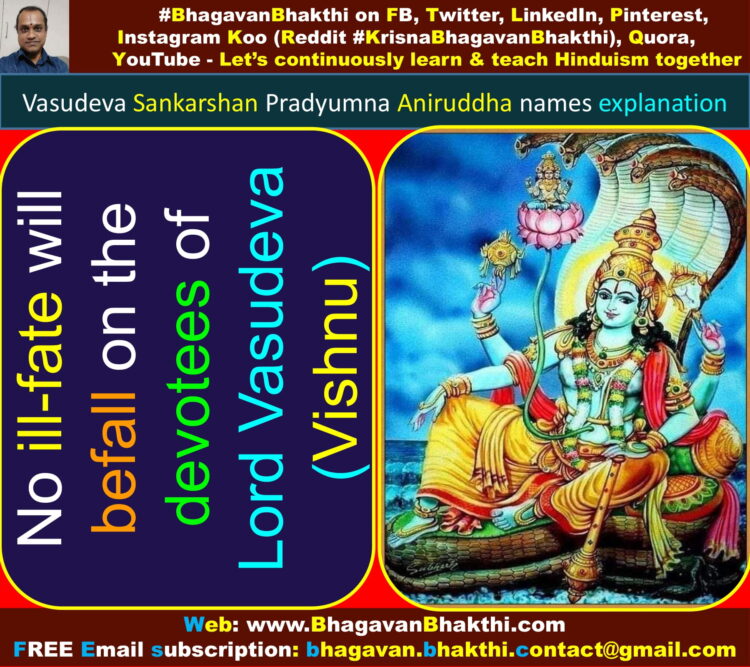
Meaning of the above shloka : No ill-fate will befall on the bhaktaadis / devotees of Lord Sri Vaasudeva (Vasudeva) and they will never ever have fear of further birth, death, old age and any diseases.
वासनाद वासुदेवस्य वासितं ते जगत्रयं | सर्वभूत निवासो असि वासुदेव नमोस्तुते || (श्री वासुदेव नमो अस्तुत ॐ नमो इति) || (श्री व्यास उवाच श्लोक #25)
ವಾಸನಾದ್ ವಾಸುದೇವಸ್ಯ ವಾಸಿತಂ ತೇ ಜಗತ್ರಯಂ | ಸರ್ವಭೂತ ನಿವಾಸೋ ಅಸಿ ವಾಸುದೇವ ನಮೋಸ್ತುತೇ || (ಶ್ರೀ ವಾಸುದೇವ ನಮೋ ಅಸ್ತುತ ಓಂ ನಮ ಇತಿ) || (ಶ್ರೀ ವ್ಯಾಸ ಉವಾಚ ಶ್ಲೋಕ #25)
vaasanaad vaasudevasya vaasitaM te jagatrayam | sarvabhuuta nivaaso asi vaasudeva namostu te || (shrii vaasudeva namo.astuta oM nama iti) || (Sri Vyaasa Uvaacha sloka#25)
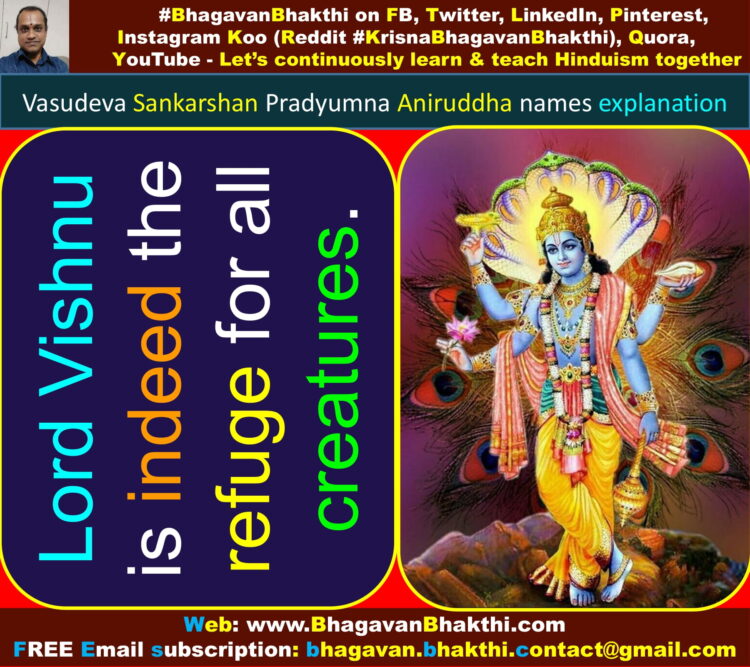
Meaning of the above shloka : Namaste / salutations to the all pervading Sarvottama / Supreme Lord Sri Vaasudeva, because of whom all the trilokas / three worlds have become possible / effective / operative / viable. He is indeed the refuge for all creatures.
ನಾರಾಯಣ ವಿಧ್ಮಹೇ | ವಾಸುದೇವಾಯ ಧೀಮಹಿ | ತನ್ನೋ ವಿಷ್ಣು ಪ್ರಚೋದಯಾತ್
नारायण विधमहे | वासुदेवाय धीमहि | तन्नो विष्णु प्रचोदयात
nārāyaṇa vidhmahē | vāsudēvāya dhīmahi | tannō viṣṇu pracōdayāt
Meaning of the above shloka : Let us all meditate on the Sarvottama / Supreme Lord Narayana, who dwells in all beings as Vaasudeva and the one who inspire us as Lord Sri Vishnu.
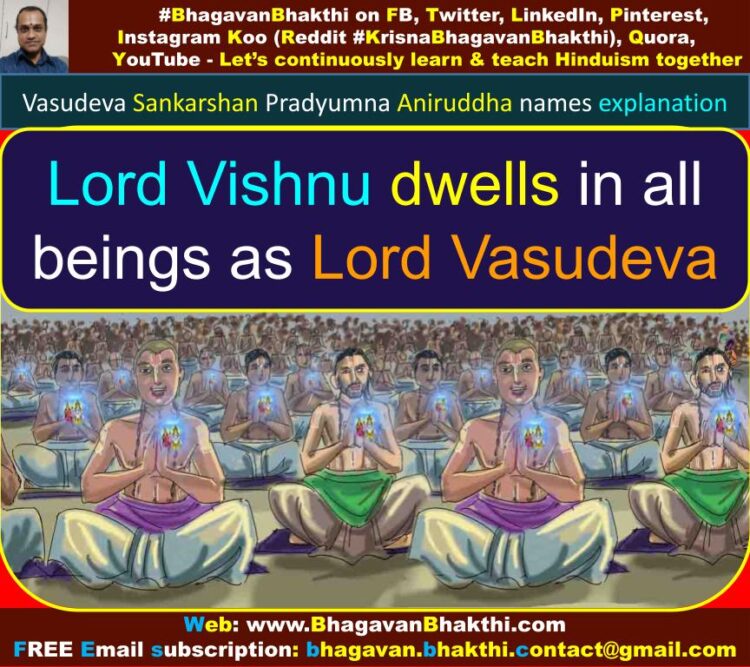
वनमालि गदी शार्ङ्गी शंखी चक्री च नंदकी | श्रीमान् नारायणो विष्णु: वासुदेवोभिरक्षतु ।।
ವನಮಾಲೀ ಗದೀ ಶಾರ್ಜ್ಗೀ ಶಂಖೀ ಚಕ್ರೀ ಚ ನಂದಕೀ | ಶ್ರೀಮಾನ್ನಾರಾಯಣೋ ವಿಷ್ಣುರ್ವಾಸುದೇವೋಽಭಿರಕ್ಷತು ||
Vanamaali gadee shaarngee shankhii chakrii cha nandakii | Shrimannaaraayano vishnur-vaasudevo-abhirakshathu ||
Meaning of the above shloka : Hey, Lord Sri Srimann Narayana the one who is adorned with a forest garland (vanamaali), who is symbolized holding the mace (Gada), Bow (Shanrga), Conch (Shankha), the Disk (Sudarshana Chakra)
and a Sword called Nandaka who is known as Lord Sri Vishnu and Vaasudeva, protect us and bestow happiness to one and all.
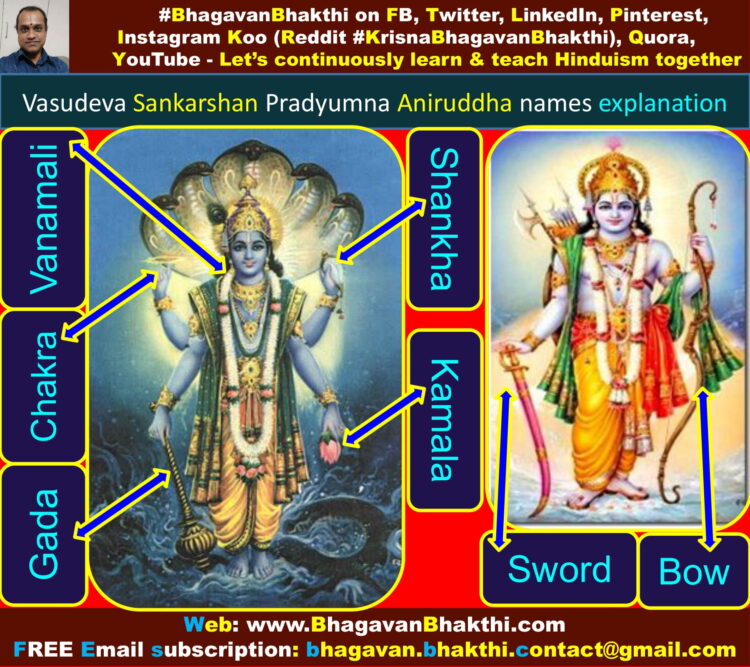
More information will be added to this on regular, please visit after some time to know more information.
To watch videos on #Hinduism #Sanskrit language, SUBSCRIBE to my YouTube channel from this below link:
#BhagavanBhakthi YouTube channel
To know more information about Hindu festivals details and significance, please click the below link:
Hindu festivals details and significance
Dear friends, if you need any clarifications about this post, kindly let me know, I will definitely try to answer all of them.
Also your one LIKE, one COMMENT, One Share, one SUBSCRIPTION is highly important.
This will help to know the quality of this content and also it will be helpful to know if any improvements is required for the content.
If you feel this content is useful to you and has helped you to improve your knowledge, kindly share this with your well-wishers.
Because “SHARING MEANS CARING”.
To receive FREE EMAIL SUBSCRIPTION about #BhagavanBhakthi, you can send an email to [email protected] from your email ID.
NAMASTE!
Sri Gurubhyo Namaha
Sri Krishnaayana Namaha
Sri Krishnaarpanamastu
Share in Social Media
Thanks for sharing such a great knowledge.
Dhanyavad for your beautiful words. Do go through the other posts of this website. Keep in touch.
Shubhamastu!
Very well explained the four bhavaa of the Lord.
Namaste,
Dhanyavad for your complements. It’s all the blessings of my Guru Deva and Bhagavan Sri Hari.
Do go through my other posts too. Keep in touch.
Shubhamastu!
Happily nicely done great
Dear Raghu Ji,
Dhanyavad for your comment. Do read my other posts to know more about #Hinduism #SanatanaDharma. Subscribe my YouTube channel to know more about #Hinduism #SanatanaDharma #Mahabharata #Ramayana #Vedas #Puranas etc. from this link : #BhagavanBhakthi YouTube channel
Keep in touch.
Shubhamastu!